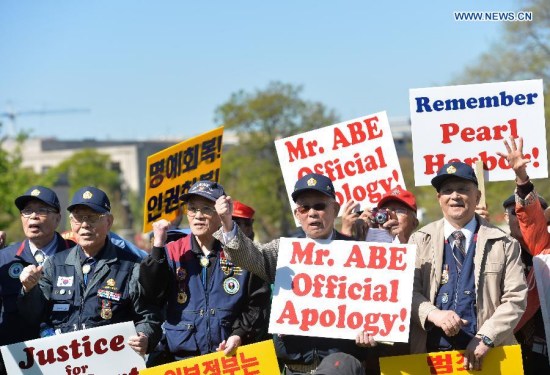
Dozens of protesters shout slogans in front of Capitol Hill as Japanese Prime Minister Shinzo Abe pays a visit to White House in Washington D.C., capital of the United States, April 28, 2015. Nearly 200 people held signs and shouted slogans in a protest against Abe's handling of history issues, demanding the Japanese leader to unequivocally apologize for his country's wartime crimes here on Tuesday. (Xinhua/Bao Dandan)
U.S. President Barack Obama held talks with Japanese Prime Minister Shinzo Abe at the White House on Tuesday, reaffirming ties between the allies on issues ranging from security to trade.
Several blocks on Capitol Hill, nearly 200 people held signs and shouted slogans in a protest against Abe's handling of history issues, demanding the Japanese leader to unequivocally apologize for his country's wartime crimes.
"For the last 70 years, Japan has been white-washing the past, but the truth of history cannot be buried," South Korean-American organizers of the protest said in a statement, urging Abe to " acknowledge and apologize" for Japan's crimes during World War II before the people of the world.
Abe's attitude toward history has strained Japan's ties with neighboring countries including China and South Korea in the run- up to and during his visit to the United States.
At a joint press conference with Obama on Tuesday, Abe again stopped short of a full apology for the atrocities committed by Japanese army during the war.
In response to a question about "comfort women", a euphemism for the females forced into sex slavery to the Japanese military during the war, Abe said he is "deeply pained to think about the comfort women who experience immeasurable pain and suffering as a result of victimization due to human trafficking."
Abe added he upholds a 1993 statement of apology on the issue known as the Kono Statement, and "has no intention to revise it." He also claimed that Japan has "made various efforts to provide realistic relief for the comfort women."
Abe will deliver a speech before a joint session of the U.S. Congress on Wednesday. Some U.S. officials and experts have called on Abe to use the occasion to apologize for Japan's wartime crimes.
"I am looking forward to this historic speech in order for Prime Minister Abe to not merely highlight our strong alliance built over since 1945 but also to deliver justice for women who have endured irreparable harm and trauma in the years before 1945, " U.S. Congressman Charles Bernard said in an opinion piece on USA Today on Monday.
Dennis Halpin, a visiting scholar at Johns Hopkins University, said that all ears in East Asia will be listening to the speech with great interest.
"Abe needs to unequivocally acknowledge and apologize for the fact that the Japanese military forced hundreds of thousands of young women from Korea and other occupied territories into sexual slavery to service Japanese troops," Halpin said, "He cannot rewrite history."
















































